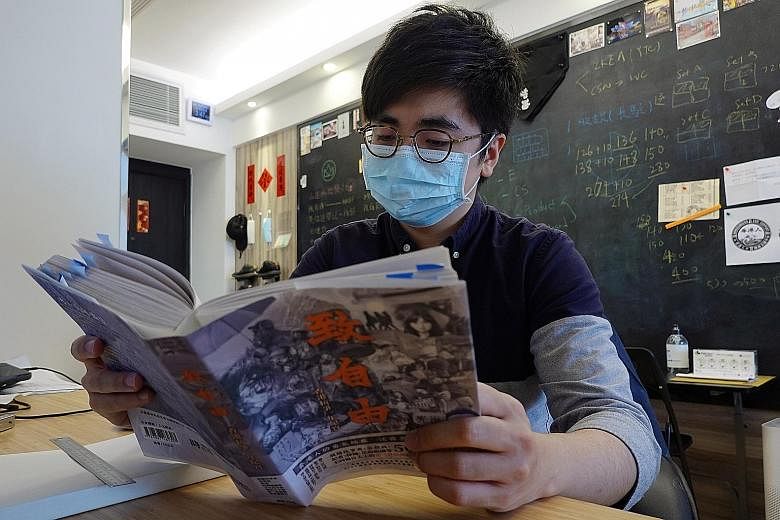HONG KONG • In the past two weeks, Hong Kong publisher Raymond Yeung has hastily made changes to a draft copy of a book entitled To Freedom, replacing "revolution" with "protests", tweaking a banned slogan and cutting passages that advocate independence for the Chinese-ruled city.
The changes were hard to make, he said, but unavoidable since China passed a national security law making secession, subversion, terrorism and collusion with foreign forces crimes punishable by up to life in prison.
"This is really painful," Mr Yeung said as he flipped through pages of the collection of essays by 50 protesters, lawyers, social workers and other participants in the pro-democracy demonstrations that shook Hong Kong last year.
"This is history. This is the truth," he said, holding up the book with blue sticky flags on many pages to mark the changes made.
Hong Kong's once-unbridled and prolific independent publishers are now censoring themselves in the face of the new law. In the past two weeks, public libraries have taken some books off the shelves, shops have removed protest-related decorations, and the slogan "Liberate Hong Kong! Revolution of our times" has been declared illegal.
To Freedom is the first political book Mr Yeung has taken on as a part-time publisher. After Beijing introduced the security law, the book's original printer bailed, and two others declined, he said.
The Hong Kong Trade Development Council, which organises the annual Hong Kong Book Fair, told exhibitors not to display "unlawful books" at this week's planned fair.
The council postponed the fair at the last minute on Monday, due to a recent spike in coronavirus cases. It did not set a new date for the event.
Non-governmental pro-Beijing groups had teamed up to urge people to report stalls at the fair selling material promoting Hong Kong independence, a subject that is anathema to the Chinese government.
"Every citizen has a duty to report crime," said Mr Innes Tang, chairman of PolitiHK Social Strategic, a group behind the campaign.
Veteran local publisher Jimmy Pang, who has participated in every fair since it began in 1990, called 2020 "the most terrifying year" because of the security law and the economic downturn that was already hurting publishers.
He said the law has prompted publishing houses and writers to halt projects while printers, distributors and bookstores have turned down sensitive books. For example, local Christian publication Breakazine said it halted distribution of its mid-July issue called "Dangerous Reading" while seeking legal advice for navigating the new law.
"Everyone is avoiding risks by suffering in silence," said Mr Pang, a spokesman for 50 exhibitors at the fair. "In the future, there will be no sensitive books related to politics."
Mr Bao Pu, son of Bao Tong, the most senior Chinese Communist Party official jailed for sympathising with Tiananmen protesters, founded New Century Press in 2005 in Hong Kong to publish books based on memoirs, government documents and other sources that often differ from China's official versions of events and could not be published on the mainland.
Mr Bao said he no longer plans to publish such books in Hong Kong, but urged other publishers to avoid self-censorship. "If everybody does that, then the law would have much more impact on freedom of speech," he said.
REUTERS

